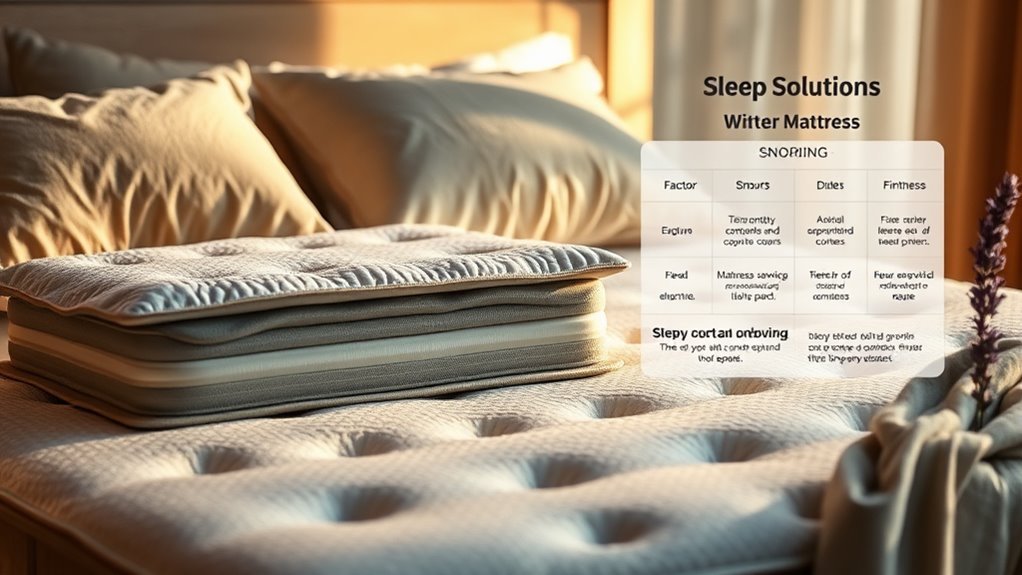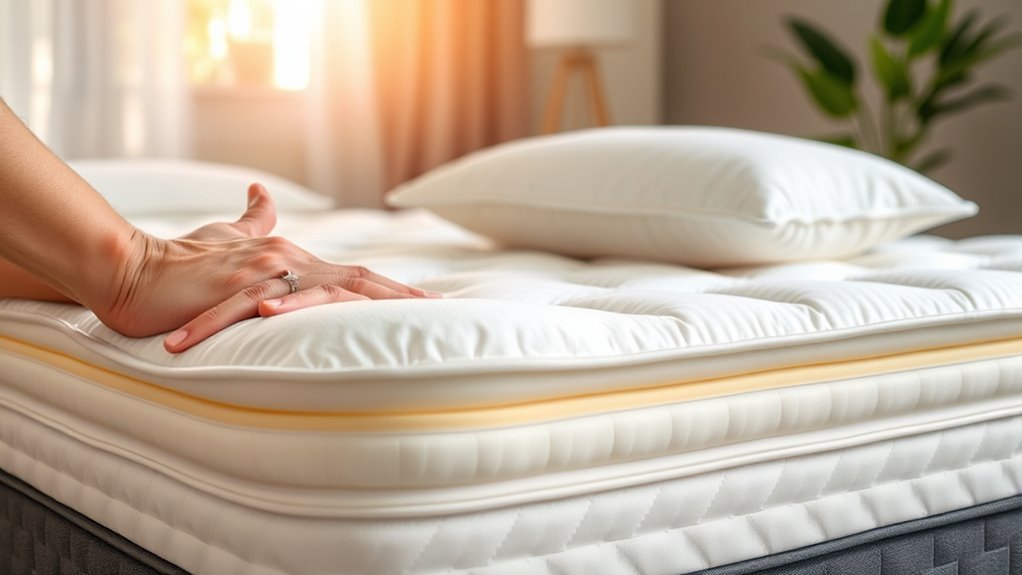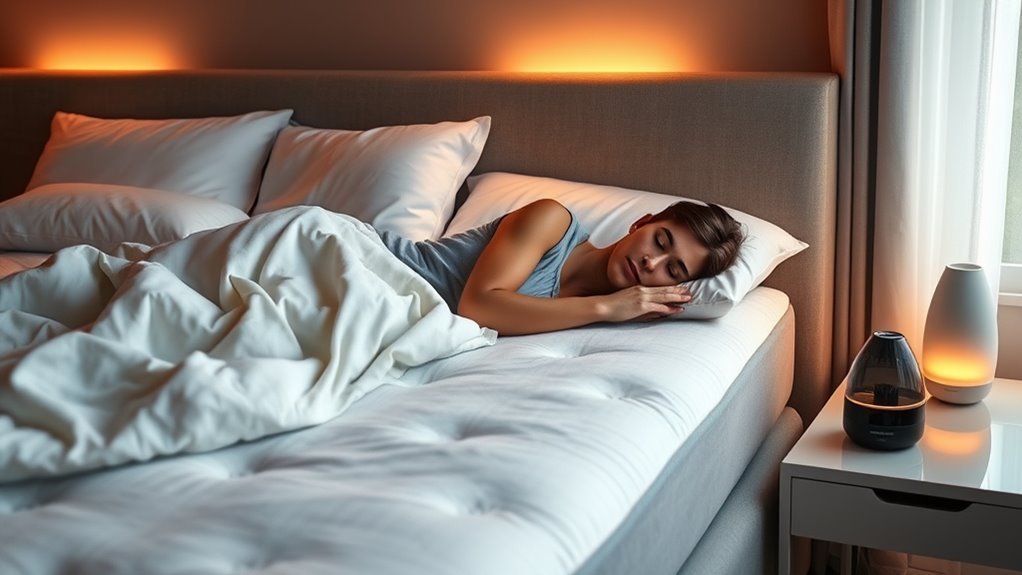To choose a mattress that reduces snoring, look for medium-firm options to maintain spinal alignment and prevent airway obstruction. Popular materials like memory foam and latex promote breathability and contour to your body. Consider an adjustable mattress for customizable support and elevation to minimize snoring. Also, make sure your sleeping position supports open airways, like side sleeping. Maintaining a clean, organized sleep environment is crucial too. Let’s explore more factors that can enhance your sleep quality.
Understanding the Causes of Snoring

While many people think snoring is just a harmless annoyance, it often stems from various underlying causes that can affect sleep quality. Understanding snoring triggers is essential for addressing this issue effectively. Common causes include nasal congestion, obesity, and the anatomy of your throat. When the airway becomes obstructed during sleep, it leads to interrupted airflow, causing the vibrating sounds associated with snoring. Factors like alcohol consumption and sleep position can also exacerbate airflow obstruction. By identifying these triggers, you can take proactive steps to minimize snoring, such as adjusting your sleeping environment or lifestyle choices. Recognizing these elements empowers you to pursue deeper, uninterrupted sleep and enhances your overall well-being.
Importance of Mattress Firmness

Choosing the right mattress firmness plays a pivotal role in reducing snoring and improving sleep quality. A mattress that provides adequate support helps maintain proper spinal alignment, which can minimize airway obstruction during sleep. If your mattress is too soft, you might sink too deeply, leading to a misaligned spine and increased snoring. Conversely, a mattress that’s too firm can cause discomfort and pressure points, disrupting your sleep comfort. Ideally, you want a medium-firm mattress that balances support and softness, allowing your body to rest comfortably while keeping your airways open. By selecting a mattress that meets your firmness needs, you’ll create an environment conducive to better sleep and potentially reduce snoring, enhancing your overall well-being.
Best Mattress Materials for Snoring Reduction

When it comes to reducing snoring, the materials used in a mattress can greatly influence your sleep quality. Memory foam is known for its contouring ability, providing support while minimizing pressure points, which can help keep your airways open. Latex mattresses offer a resilient surface that promotes breathability and airflow technology, essential for maintaining a cool sleep environment. These materials can enhance your overall comfort and potentially reduce snoring. Hybrid options combine the benefits of both memory foam and innerspring systems, delivering support and adaptability. When selecting a mattress, prioritize materials that enhance airflow and support to create an ideal sleeping arrangement that encourages better breathing and less snoring, ultimately allowing you the freedom to enjoy restorative sleep.
The Role of Sleeping Position
Although your mattress plays an essential role in sleep quality, your sleeping position can dramatically impact snoring. As a side sleeper, you’re often less likely to snore since this position keeps your airways open. Back sleepers, however, may experience increased snoring as gravity can cause the tongue to fall back and obstruct airflow. If you’re a stomach sleeper, you might find it challenging to maintain proper neck alignment, which can also contribute to snoring. For those who switch between hybrid positions, it’s vital to choose a mattress that adapts well to your movements. Finding the right support for your sleeping position can notably reduce snoring and enhance your overall sleep experience.
Adjustable Mattresses: A Flexible Solution
If you’re looking for a versatile solution to reduce snoring, adjustable mattresses might be just what you need. These mattresses offer adjustable firmness and customizable elevation, allowing you to find the perfect position for a restful night. By elevating your head and torso, you can minimize airway obstruction, making it easier to breathe.
Here’s a quick overview of adjustable mattress benefits:
| Feature | Benefit | Impact on Snoring |
|---|---|---|
| Adjustable Firmness | Tailors support to your preference | Reduces pressure points |
| Customizable Elevation | Elevates head for better airflow | Decreases snoring frequency |
| Remote Control | Easily adjust settings | Convenient for all sleepers |
With these features, an adjustable mattress can empower you to take control of your sleep quality.
How Pillow Choice Affects Snoring
The choice of pillow can greatly impact your snoring, as the right elevation and support can help keep your airways open during sleep. Opt for a pillow height that maintains proper neck alignment, reducing pressure on your throat. Consider your firmness preference, as a medium-firm pillow often provides the best balance of support and comfort. Material choice also matters; memory foam or latex can contour to your head and neck, enhancing airway openness. If you have sleep apnea, a thicker pillow may help. Additionally, allergy considerations are vital; hypoallergenic materials can prevent irritation, ensuring a restful night. Ultimately, finding the right pillow that aligns with your comfort level can greatly reduce snoring and improve your sleep quality.
Evaluating Motion Isolation Features
When you’re choosing a mattress, evaluating motion isolation features is essential, especially if you share your bed with a partner. Motion transfer can disrupt your sleep, particularly if one of you tends to move around at night. Look for mattresses that excel in isolating motion, such as memory foam or hybrid designs. These materials absorb movements, ensuring that you won’t feel your partner tossing and turning. Also, consider the compatibility of your mattress with your bed frame; a solid foundation can enhance stability and further reduce motion transfer. By prioritizing these features, you can create a more restful sleep environment, ultimately leading to better snoring reduction for both you and your partner.
Temperature Regulation and Snoring
After ensuring motion isolation, the next consideration in your mattress choice is temperature regulation, which plays a significant role in snoring reduction. A mattress that maintains a comfortable temperature can help you breathe easier at night, reducing snoring. Look for options with enhanced breathability features and cooling technologies, as they promote airflow and wick away heat.
| Feature | Benefits |
|---|---|
| Gel-infused Memory Foam | Provides cooling sensation |
| Latex | Naturally breathable |
| Open-cell Structure | Enhances airflow |
| Phase Change Materials | Regulates temperature |
| Hybrid Design | Combines support with cooling |
Selecting a mattress with these features can help you achieve a restful night’s sleep and minimize snoring, allowing you to wake up refreshed.
Trial Periods and Return Policies
While you might find the perfect mattress online, it’s essential to evaluate trial periods and return policies before making a commitment. These factors can greatly impact your purchasing experience. A generous trial period allows you to test the mattress in your own environment, offering a chance to assess how well it helps with snoring. Look for at least a 30-night trial; anything less might not give you enough time to adapt.
Additionally, familiarize yourself with the return policies. Some brands may charge fees for returns, while others might offer free shipping. Understanding these details guarantees you have the freedom to make the right choice without feeling locked in. Prioritize brands that offer a hassle-free return experience for peace of mind.
Maintenance Tips for a Snore-Free Sleep Environment
To create a snore-free sleep environment, maintaining a regular cleaning schedule is essential. This not only helps eliminate allergens but also contributes to better air quality. Additionally, controlling humidity levels can greatly impact your comfort and reduce snoring.
Regular Cleaning Schedule
Keeping your mattress clean is essential for reducing snoring, as allergens and dust mites can contribute to respiratory issues during sleep. Establish a regular cleaning schedule to maintain a healthy sleep environment. Aim to vacuum your mattress every two weeks to remove dust mites and allergens effectively. Additionally, wash your bedding weekly in hot water to eliminate any lurking irritants. Don’t forget to rotate your mattress every three months to guarantee even wear and promote longevity. If your mattress is machine washable, consider deep cleaning it every six months to maintain freshness. By adhering to this cleaning frequency, you’ll create a more comfortable space that may help you breathe easier and sleep soundly, ultimately reducing your snoring.
Humidity Control Measures
Maintaining ideal humidity levels in your bedroom is essential for reducing snoring, as dry air can irritate your airways while excessive moisture can promote mold and dust mite growth. To achieve the best humidity control, aim for a range between 30% and 50%. You can use a hygrometer to monitor levels accurately. If the air’s too dry, consider a humidifier to boost moisture, which improves air quality and soothes your throat. Conversely, if it’s too humid, a dehumidifier can help reduce moisture, ensuring a comfortable environment. Regularly ventilate your space to prevent stale air buildup. By managing humidity effectively, you’ll not only enhance your sleep quality but also support a snore-free sleep environment.
Frequently Asked Questions
Can Snoring Be a Sign of a Serious Health Condition?
Yes, snoring can be a sign of a serious health condition, like sleep apnea. If you’re waking up feeling tired despite a full night’s rest, it’s vital to pay attention to your body. This isn’t just about snoring; it’s about health awareness. Ignoring these signs could lead to more significant issues down the road. So, if you’re concerned, consulting a healthcare professional might just be the freeing step you need to take.
How Often Should I Replace My Mattress to Reduce Snoring?
You should replace your mattress every 7 to 10 years to maintain ideal support and comfort, which can help reduce snoring frequency. Over time, a mattress loses its lifespan, impacting your sleep quality. If you notice your mattress sagging or causing discomfort, it’s time for a change. A new mattress can improve your sleep environment, potentially alleviating snoring issues and enhancing your overall well-being, allowing you to enjoy restful nights again.
Do Specific Mattress Brands Offer Better Snoring Solutions?
When it comes to mattress brands, you’ve got to do your homework. Some brands, like Tempur-Pedic or Purple, excel in memory foam technology, which can contour to your body and help reduce snoring. Look for options with adjustable firmness, allowing you to customize the support based on your sleeping position. While no one-size-fits-all solution exists, investing in the right mattress can make a world of difference for a peaceful night’s sleep.
Can Lifestyle Changes Impact Snoring More Than a New Mattress?
Absolutely, lifestyle changes can impact snoring more than a new mattress. By making dietary changes, like avoiding heavy meals before bed, you can reduce snoring. Additionally, adjusting your sleep position can play a significant role; sleeping on your side often minimizes airway obstruction. Even incorporating regular exercise can help. While a good mattress is important, these changes might provide you with more immediate relief and enhance your overall sleep quality.
Is Snoring Influenced by Allergens in Mattress Materials?
Yes, snoring can be influenced by allergens in mattress materials. Common allergen types like dust mites, mold, and pet dander often accumulate in bedding. When you’re exposed to these allergens, they can trigger respiratory issues, making it harder to breathe at night, which may lead to snoring. Choosing hypoallergenic mattress materials can help reduce these irritants, promoting a healthier sleep environment and potentially alleviating snoring problems.



